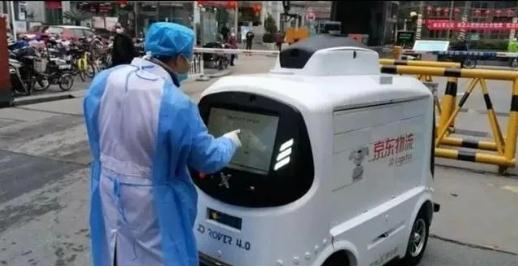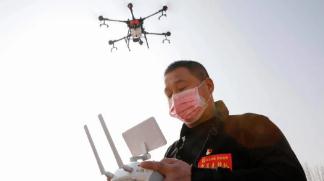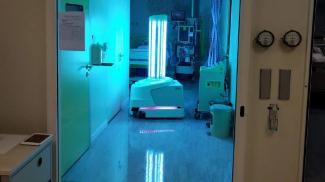当地时间24日,CNN刊登了一篇文章“无人机、消毒机器人、超级计算机——新冠肺炎疫情是对中国技术企业的一次测试”,一一列举了中国疫情中用的一些新技术。

China has spent decades nurturing its tech sector. Now, faced with a massive public health crisis, Beijing is pushing its tech companies to join the fight against the novel coronavirus.
过去的几十年中,中国始终致力于发展高科技产业。现在,面临着公共卫生危机的时刻,中国的科技公司走上一线对抗新冠病毒。
The country's tech giants have responded to the outbreak by deploying autonomous vehicles to bring supplies to medical workers, fitting drones with thermal cameras to improve detection of the virus and lending their computing power to help develop a vaccine.
中国的科技公司参与抗疫的形式多种多样,包括用自动车给医护人员送餐、给无人机加装热成像仪,以及为研制疫苗贡献出部分计算机算力。
自动驾驶机器人
CNN首先注意到的,是送货机器人,文章中这样描述:
Chinese e-commerce giant JD.com (JD) recently enlisted self-driving robots to bring goods to medical workers in the central Chinese city of Wuhan.
在武汉,电子商务公司京东启用自动驾驶机器人给医护人员送补给。

The bots, which look and run much like pint-sized vehicles, have been delivering packages to a hospital that primarily treats coronavirus patients. The route is relatively short — about 600 meters to the hospital — but cutting humans out of the equation has helped protect customers and employees.
这些机器人看起来很像一个矮小的小车,主要工作是给收治病人的医院送快递。路径不长,也就600米,但有了小车就能避免人员接触,从而保护医护人员也保护快递员。
无人机
其次上榜的是无人机。
Drones have also been put to use during the outbreak. The technology allows authorities to scan through large crowds and spot if someone's in need of medical attention...
无人机也被应用到抗疫中来。这一技术使得政府能大批量扫描人群,并识别出是否有人需要医疗救助……

高速计算机
高速计算机也成了CNN关注的焦点:
This month, Tencent opened up its super-computing facilities — which include machines that can run calculations much faster than an ordinary PC — to help researchers racing to find a cure.
就在本月,腾讯公司开放了其超级算力设施,包括比普通计算机快得多的机器,以帮助研究人员寻找治疗措施。
And Didi, China's biggest ride-hailing provider, has teamed up with medical and aid organizations to allow workers who need to perform tasks related to data analysis, online simulation or logistical support to use Didi's servers for free.
中国最大的打车软件滴滴则与医疗和救助组织联手,让那些需要做数据分析、物流或者网上仿真的人免费使用其服务器。
外媒关注中国高科技抗疫
除CNN之外,中国的抗疫无人机、机器人也登上其它多家外媒,在西方舆论场中形成一个新热点。
《商业内幕》(Business Insider)分享了一张视频截图,是一台叫“小花生”的送餐机器人给隔离人员送餐。
小花生你火到国外了!

全球电气电子工程师学会IEEE官网也登了小花生的视频,说这些机器人能送药、能送饭,还能打扫房间(using robots to deliver medicine, food, and disinfect rooms)。

福克斯新闻(Fox News)这次也赶潮流。
列举了中国抗疫机器人之后,他们还采访了休斯敦赖斯大学的机器人专家Marcia O'Malley教授,这位教授对中国机器人一顿狠夸:
O'Malley said robots in China can do more than deliver medicine, however. Some can scan medicine inventory and remove outdated supplies. Others can spray disinfectants and can even prevent the spread of infectious diseases in public spaces.
O'Malley说中国的机器人能干的可不止是送药。有些能扫描药品库存,清理过期部分;有些能在公共场所喷洒消毒液以防止传染病传播。
"Robots can help with decontamination and reducing human-to-human transmission risk by reducing exposure," O'Malley said. "Artificial intelligence might be helpful in data science aspects, tracking information about the spread of cases to determine risk profiles and identify ways to limit spread if we understand better how it is spread.”
他说:“机器人有助于消除污染,减少人在病毒污染环境中的暴露,从而减少人传人风险。AI或许能在数据科学方面起作用,追溯传染病的传播信息、确定危险程度,并找出限制传染病传播的办法。”
新加坡的《海峡时报》则把目光投向了广东。
Over in Guangzhou, in southern Guangdong province, 5G-powered patrolling robots remind the public of the importance of frequent hand-washing and the mandatory donning of masks. The robots are also equipped with high-resolution cameras and infrared thermometers that are capable of scanning the body temperatures of 10 people at once.
在广州市,装有5G网络的机器人来回巡逻,向公众普及勤洗手和戴口罩的必要性。这些机器人也装备有高科技摄像机和红外线测温仪,能同时扫描10人的体温。
连建筑设计杂志Dezeen都跨界来报道了,精心选了一张紫外线消毒的配图,蓝紫色调,艺术范:

Unmanned vehicles, both arial and terrestrial, have allowed the Chinese government to reduce the number of people put at risk of catching the virus.
无论是天上的无人机,还是地上的无人车,都让中国有能力降低公众感染的风险。
彭博社也深入广东,找到了一家做无人机的企业。
Guangzhou-based agriculture drone manufacturer XAG is working to deploy a fleet of drones that can spray disinfectant on affected areas such as bus and train stations and other public spaces.
广州农业无人机企业XAG正努力装备一支无人机群,主要目的是对包括汽车站、火车站在内的公共场所洒消毒液。
记得十几二十年前,外媒提到中国还都是以国际关系报道为主,很少花篇幅报道中国科技进步。
慢慢地,外媒关于中国科技的报道越来越多,用词也越来越走向正面,这一波中国高科技抗疫的报道就是典型。
这一转变的背后,是中国科技扎扎实实的进步,而这一进步是几代科技工作者的努力换来的。科技进步不易,且行且珍惜。
(作者:张周项 来源:中国日报双语新闻微信公众号)







